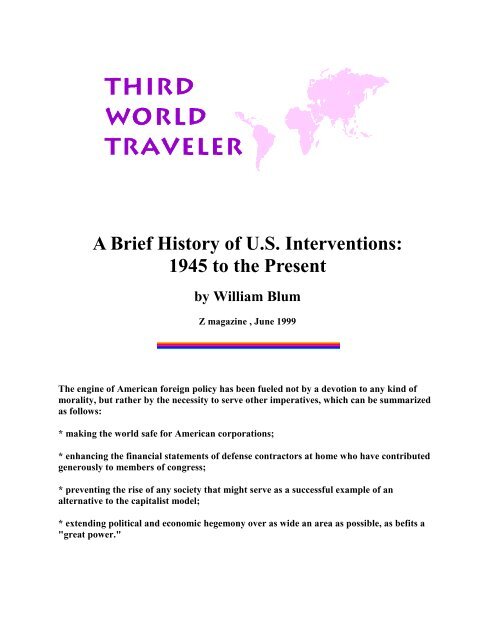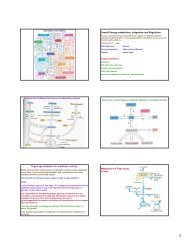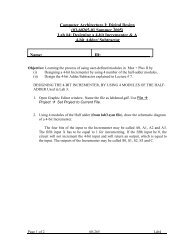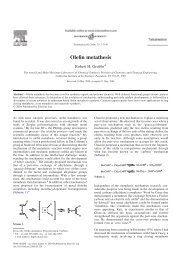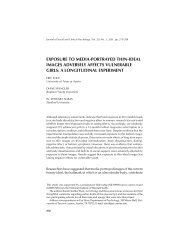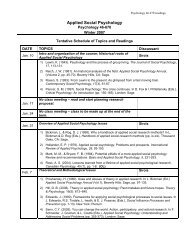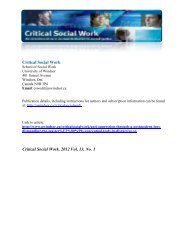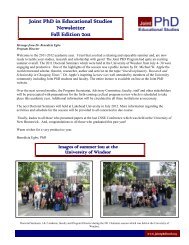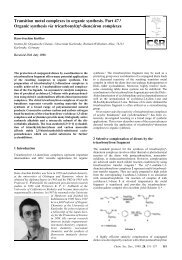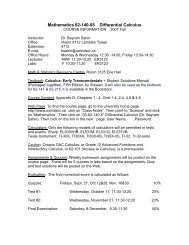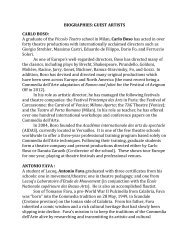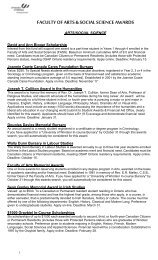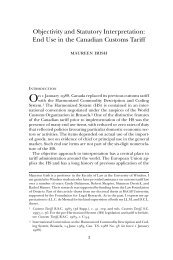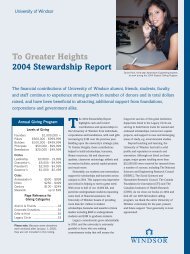A Brief History of US Interventions: 1945 to the Present by William ...
A Brief History of US Interventions: 1945 to the Present by William ...
A Brief History of US Interventions: 1945 to the Present by William ...
Create successful ePaper yourself
Turn your PDF publications into a flip-book with our unique Google optimized e-Paper software.
A <strong>Brief</strong> <strong>His<strong>to</strong>ry</strong> <strong>of</strong> U.S. <strong>Interventions</strong>:<br />
<strong>1945</strong> <strong>to</strong> <strong>the</strong> <strong>Present</strong><br />
<strong>by</strong> <strong>William</strong> Blum<br />
Z magazine , June 1999<br />
The engine <strong>of</strong> American foreign policy has been fueled not <strong>by</strong> a devotion <strong>to</strong> any kind <strong>of</strong><br />
morality, but ra<strong>the</strong>r <strong>by</strong> <strong>the</strong> necessity <strong>to</strong> serve o<strong>the</strong>r imperatives, which can be summarized<br />
as follows:<br />
* making <strong>the</strong> world safe for American corporations;<br />
* enhancing <strong>the</strong> financial statements <strong>of</strong> defense contrac<strong>to</strong>rs at home who have contributed<br />
generously <strong>to</strong> members <strong>of</strong> congress;<br />
* preventing <strong>the</strong> rise <strong>of</strong> any society that might serve as a successful example <strong>of</strong> an<br />
alternative <strong>to</strong> <strong>the</strong> capitalist model;<br />
* extending political and economic hegemony over as wide an area as possible, as befits a<br />
"great power."
This in <strong>the</strong> name <strong>of</strong> fighting a supposed moral crusade against what cold warriors<br />
convinced <strong>the</strong>mselves, and <strong>the</strong> American people, was <strong>the</strong> existence <strong>of</strong> an evil International<br />
Communist Conspiracy, which in fact never existed, evil or not.<br />
The United States carried out extremely serious interventions in<strong>to</strong> more than 70 nations in<br />
this period.<br />
China, <strong>1945</strong>-49:<br />
Intervened in a civil war, taking <strong>the</strong> side <strong>of</strong> Chiang Kai-shek against <strong>the</strong> Communists, even<br />
though <strong>the</strong> latter had been a much closer ally <strong>of</strong> <strong>the</strong> United States in <strong>the</strong> world war. The<br />
U.S. used defeated Japanese soldiers <strong>to</strong> fight for its side. The Communists forced Chiang <strong>to</strong><br />
flee <strong>to</strong> Taiwan in 1949.<br />
Italy, 1947-48:<br />
Using every trick in <strong>the</strong> book, <strong>the</strong> U.S. interfered in <strong>the</strong> elections <strong>to</strong> prevent <strong>the</strong> Communist<br />
Party from coming <strong>to</strong> power legally and fairly. This perversion <strong>of</strong> democracy was done in<br />
<strong>the</strong> name <strong>of</strong> "saving democracy" in Italy. The Communists lost. For <strong>the</strong> next few decades,<br />
<strong>the</strong> CIA, along with American corporations, continued <strong>to</strong> intervene in Italian elections,<br />
pouring in hundreds <strong>of</strong> millions <strong>of</strong> dollars and much psychological warfare <strong>to</strong> block <strong>the</strong><br />
specter that was haunting Europe.<br />
Greece, 1947-49:<br />
Intervened in a civil war, taking <strong>the</strong> side <strong>of</strong> <strong>the</strong> neo-fascists against <strong>the</strong> Greek left which<br />
had fought <strong>the</strong> Nazis courageously. The neo-fascists won and instituted a highly brutal<br />
regime, for which <strong>the</strong> CIA created a new internal security agency, KYP. Before long, KYP<br />
was carrying out all <strong>the</strong> endearing practices <strong>of</strong> secret police everywhere, including<br />
systematic <strong>to</strong>rture.<br />
Philippines, <strong>1945</strong>-53:<br />
U.S. military fought against leftist forces (Huks) even while <strong>the</strong> Huks were still fighting<br />
against <strong>the</strong> Japanese invaders. After <strong>the</strong> war, <strong>the</strong> U. S. continued its fight against <strong>the</strong> Huks,<br />
defeating <strong>the</strong>m, and <strong>the</strong>n installing a series <strong>of</strong> puppets as president, culminating in <strong>the</strong><br />
dicta<strong>to</strong>rship <strong>of</strong> Ferdinand Marcos.<br />
South Korea, <strong>1945</strong>-53:<br />
After World War II, <strong>the</strong> United States suppressed <strong>the</strong> popular progressive forces in favor<br />
<strong>of</strong> <strong>the</strong> conservatives who had collaborated with <strong>the</strong> Japanese. This led <strong>to</strong> a long era <strong>of</strong><br />
corrupt, reactionary, and brutal governments.<br />
Albania, 1949-53:
The U.S. and Britain tried unsuccessfully <strong>to</strong> overthrow <strong>the</strong> communist government and<br />
install a new one that would have been pro-Western and composed largely <strong>of</strong> monarchists<br />
and collabora<strong>to</strong>rs with Italian fascists and Nazis.<br />
Germany, 1950s:<br />
The CIA orchestrated a wide-ranging campaign <strong>of</strong> sabotage, terrorism, dirty tricks, and<br />
psychological warfare against East Germany. This was one <strong>of</strong> <strong>the</strong> fac<strong>to</strong>rs which led <strong>to</strong> <strong>the</strong><br />
building <strong>of</strong> <strong>the</strong> Berlin Wall in 1961.<br />
Iran, 1953:<br />
Prime Minister Mossadegh was overthrown in a joint U.S./British operation. Mossadegh<br />
had been elected <strong>to</strong> his position <strong>by</strong> a large majority <strong>of</strong> parliament, but he had made <strong>the</strong><br />
fateful mistake <strong>of</strong> spearheading <strong>the</strong> movement <strong>to</strong> nationalize a British-owned oil company,<br />
<strong>the</strong> sole oil company operating in Iran. The coup res<strong>to</strong>red <strong>the</strong> Shah <strong>to</strong> absolute power and<br />
began a period <strong>of</strong> 25 years <strong>of</strong> repression and <strong>to</strong>rture, with <strong>the</strong> oil industry being res<strong>to</strong>red <strong>to</strong><br />
foreign ownership, as follows: Britain and <strong>the</strong> U.S., each 40 percent, o<strong>the</strong>r nations 20<br />
percent.<br />
Guatemala, 1953-1990s:<br />
A CIA-organized coup overthrew <strong>the</strong> democratically-elected and progressive government<br />
<strong>of</strong> Jacobo Arbenz, initiating 40 years <strong>of</strong> death-squads, <strong>to</strong>rture, disappearances, mass<br />
executions, and unimaginable cruelty, <strong>to</strong>taling well over 100,000 victims -indisputably one<br />
<strong>of</strong> <strong>the</strong> most inhuman chapters <strong>of</strong> <strong>the</strong> 20th century. Arbenz had nationalized <strong>the</strong> U.S. firm,<br />
United Fruit Company, which had extremely close ties <strong>to</strong> <strong>the</strong> American power elite. As<br />
justification for <strong>the</strong> coup, Washing<strong>to</strong>n declared that Guatemala had been on <strong>the</strong> verge <strong>of</strong> a<br />
Soviet takeover, when in fact <strong>the</strong> Russians had so little interest in <strong>the</strong> country that it didn't<br />
even maintain diplomatic relations. The real problem in <strong>the</strong> eyes <strong>of</strong> Washing<strong>to</strong>n, in<br />
addition <strong>to</strong> United Fruit, was <strong>the</strong> danger <strong>of</strong> Guatemala's social democracy spreading <strong>to</strong><br />
o<strong>the</strong>r countries in Latin America.<br />
Middle East, 1956-58:<br />
The Eisenhower Doctrine stated that <strong>the</strong> United States "is prepared <strong>to</strong> use armed forces <strong>to</strong><br />
assist" any Middle East country "requesting assistance against armed aggression from any<br />
country controlled <strong>by</strong> international communism." The English translation <strong>of</strong> this was that<br />
no one would be allowed <strong>to</strong> dominate, or have excessive influence over, <strong>the</strong> middle east and<br />
its oil fields except <strong>the</strong> United States, and that anyone who tried would be, <strong>by</strong> definition,<br />
"Communist." In keeping with this policy, <strong>the</strong> United States twice attempted <strong>to</strong> overthrow<br />
<strong>the</strong> Syrian government, staged several shows-<strong>of</strong>-force in <strong>the</strong> Mediterranean <strong>to</strong> intimidate<br />
movements opposed <strong>to</strong> U.S.-supported governments in Jordan and Lebanon, landed 14,000<br />
troops in Lebanon, and conspired <strong>to</strong> overthrow or assassinate Nasser <strong>of</strong> Egypt and his<br />
troublesome middle-east nationalism.
Indonesia, 1957-58:<br />
Sukarno, like Nasser, was <strong>the</strong> kind <strong>of</strong> Third World leader <strong>the</strong> United States could not<br />
abide. He <strong>to</strong>ok neutralism in <strong>the</strong> cold war seriously, making trips <strong>to</strong> <strong>the</strong> Soviet Union and<br />
China (though <strong>to</strong> <strong>the</strong> White House as well). He nationalized many private holdings <strong>of</strong> <strong>the</strong><br />
Dutch, <strong>the</strong> former colonial power. He refused <strong>to</strong> crack down on <strong>the</strong> Indonesian Communist<br />
Party, which was walking <strong>the</strong> legal, peaceful road and making impressive gains elec<strong>to</strong>rally.<br />
Such policies could easily give o<strong>the</strong>r Third World leaders "wrong ideas." The CIA began<br />
throwing money in<strong>to</strong> <strong>the</strong> elections, plotted Sukarno's assassination, tried <strong>to</strong> blackmail him<br />
with a phony sex film, and joined forces with dissident military <strong>of</strong>ficers <strong>to</strong> wage a full-scale<br />
war against <strong>the</strong> government. Sukarno survived it all.<br />
British Guiana/Guyana, 1953-64:<br />
For 11 years, two <strong>of</strong> <strong>the</strong> oldest democracies in <strong>the</strong> world, Great Britain and <strong>the</strong> United<br />
States, went <strong>to</strong> great lengths <strong>to</strong> prevent a democratically elected leader from occupying his<br />
<strong>of</strong>fice. Cheddi Jagan was ano<strong>the</strong>r Third World leader who tried <strong>to</strong> remain neutral and<br />
independent. He was elected three times. Although a leftist-more so than Sukarno or<br />
Arbenz-his policies in <strong>of</strong>fice were not revolutionary. But he was still a marked man, for he<br />
represented Washing<strong>to</strong>n's greatest fear: building a society that might be a successful<br />
example <strong>of</strong> an alternative <strong>to</strong> <strong>the</strong> capitalist model. Using a wide variety <strong>of</strong> tactics-from<br />
general strikes and disinformation <strong>to</strong> terrorism and British legalisms, <strong>the</strong> U. S. and Britain<br />
finally forced Jagan out in 1964. John F. Kennedy had given a direct order for his ouster,<br />
as, presumably, had Eisenhower.<br />
One <strong>of</strong> <strong>the</strong> better-<strong>of</strong>f countries in <strong>the</strong> region under Jagan, Guyana, <strong>by</strong> <strong>the</strong> 1980s, was one <strong>of</strong><br />
<strong>the</strong> poorest. Its principal export became people.<br />
Vietnam, 1950-73:<br />
The slippery slope began with siding with ~ French, <strong>the</strong> former colonizers and<br />
collabora<strong>to</strong>rs with <strong>the</strong> Japanese, against Ho Chi Minh and his followers who had worked<br />
closely with <strong>the</strong> Allied war effort and admired all things American. Ho Chi Minh was, after<br />
all, some kind <strong>of</strong> Communist. He had written numerous letters <strong>to</strong> President Truman and<br />
<strong>the</strong> State Department asking for America's help in winning Vietnamese independence from<br />
<strong>the</strong> French and finding a peaceful solution for his country. All his entreaties were ignored.<br />
Ho Chi Minh modeled <strong>the</strong> new Vietnamese declaration <strong>of</strong> independence on <strong>the</strong> American,<br />
beginning it with "All men are created equal. They are endowed <strong>by</strong> <strong>the</strong>ir Crea<strong>to</strong>r with ..."<br />
But this would count for nothing in Washing<strong>to</strong>n. Ho Chi Minh was some kind <strong>of</strong><br />
Communist.<br />
Twenty-three years and more than a million dead, later, <strong>the</strong> United States withdrew its<br />
military forces from Vietnam. Most people say that <strong>the</strong> U.S. lost <strong>the</strong> war. But <strong>by</strong> destroying<br />
Vietnam <strong>to</strong> its core, and poisoning <strong>the</strong> earth and <strong>the</strong> gene pool for generations, Washing<strong>to</strong>n<br />
had achieved its main purpose: preventing what might have been <strong>the</strong> rise <strong>of</strong> a good<br />
development option for Asia. Ho Chi Minh was, after all, some kind <strong>of</strong> communist.
Cambodia, 1955-73:<br />
Prince Sihanouk was yet ano<strong>the</strong>r leader who did not fancy being an American client. After<br />
many years <strong>of</strong> hostility <strong>to</strong>wards his regime, including assassination plots and <strong>the</strong> infamous<br />
Nixon/Kissinger secret "carpet bombings" <strong>of</strong> 1969-70, Washing<strong>to</strong>n finally overthrew<br />
Sihanouk in a coup in 1970. This was all that was needed <strong>to</strong> impel Pol Pot and his Khmer<br />
Rouge forces <strong>to</strong> enter <strong>the</strong> fray. Five years later, <strong>the</strong>y <strong>to</strong>ok power. But five years <strong>of</strong><br />
American bombing had caused Cambodia's traditional economy <strong>to</strong> vanish. The old<br />
Cambodia had been destroyed forever.<br />
Incredibly, <strong>the</strong> Khmer Rouge were <strong>to</strong> inflict even greater misery on this unhappy land. To<br />
add <strong>to</strong> <strong>the</strong> irony, <strong>the</strong> United States supported Pol Pot, militarily and diplomatically, after<br />
<strong>the</strong>ir subsequent defeat <strong>by</strong> <strong>the</strong> Vietnamese.<br />
The Congo/Zaire, 1960-65:<br />
In June 1960, Patrice Lumumba became <strong>the</strong> Congo's first prime minister after<br />
independence from Belgium. But Belgium retained its vast mineral wealth in Katanga<br />
province, prominent Eisenhower administration <strong>of</strong>ficials had financial ties <strong>to</strong> <strong>the</strong> same<br />
wealth, and Lumumba, at Independence Day ceremonies before a host <strong>of</strong> foreign<br />
dignitaries, called for <strong>the</strong> nation's economic as well as its political liberation, and recounted<br />
a list <strong>of</strong> injustices against <strong>the</strong> natives <strong>by</strong> <strong>the</strong> white owners <strong>of</strong> <strong>the</strong> country. The man was<br />
obviously a "Communist." The poor man was obviously doomed.<br />
Eleven days later, Katanga province seceded, in September, Lumumba was dismissed <strong>by</strong><br />
<strong>the</strong> president at <strong>the</strong> instigation <strong>of</strong> <strong>the</strong> United States, and in January 1961 he was<br />
assassinated at <strong>the</strong> express request <strong>of</strong> Dwight Eisenhower. There followed several years <strong>of</strong><br />
civil conflict and chaos and <strong>the</strong> rise <strong>to</strong> power <strong>of</strong> Mobutu Sese Seko, a man not a stranger <strong>to</strong><br />
<strong>the</strong> CIA. Mobutu went on <strong>to</strong> rule <strong>the</strong> country for more than 30 years, with a level <strong>of</strong><br />
corruption and cruelty that shocked even his CIA handlers. The Zairian people lived in<br />
abject poverty despite <strong>the</strong> plentiful natural wealth, while Mobutu became a<br />
multibillionaire.<br />
Brazil, 1961-64:<br />
President Joao Goulart was guilty <strong>of</strong> <strong>the</strong> usual crimes: He <strong>to</strong>ok an independent stand in<br />
foreign policy, resuming relations with socialist countries and opposing sanctions against<br />
Cuba; his administration passed a law limiting <strong>the</strong> amount <strong>of</strong> pr<strong>of</strong>its multinationals could<br />
transmit outside <strong>the</strong> country; a subsidiary <strong>of</strong> ITT was nationalized; he promoted economic<br />
and social reforms. And At<strong>to</strong>rney-General Robert Kennedy was uneasy about Goulart<br />
allowing "communists" <strong>to</strong> hold positions in government agencies. Yet <strong>the</strong> man was no<br />
radical. He was a millionaire land-owner and a Catholic who wore a medal <strong>of</strong> <strong>the</strong> Virgin<br />
around his neck. That, however, was not enough <strong>to</strong> save him. In 1964, he was overthrown<br />
in a military coup which had deep, covert American involvement. The <strong>of</strong>ficial Washing<strong>to</strong>n<br />
line was...yes, it's unfortunate that democracy has been overthrown in Brazil...but, still, <strong>the</strong><br />
country has been saved from communism.
For <strong>the</strong> next 15 years, all <strong>the</strong> features <strong>of</strong> military dicta<strong>to</strong>rship that Latin America has come<br />
<strong>to</strong> know were instituted: Congress was shut down, political opposition was reduced <strong>to</strong><br />
virtual extinction, habeas corpus for "political crimes" was suspended, criticism <strong>of</strong> <strong>the</strong><br />
president was forbidden <strong>by</strong> law, labor unions were taken over <strong>by</strong> government interveners,<br />
mounting protests were met <strong>by</strong> police and military firing in<strong>to</strong> crowds, peasants' homes<br />
were burned down, priests were brutalized...disappearances, death squads, a remarkable<br />
degree and depravity <strong>of</strong> <strong>to</strong>rture...<strong>the</strong> government had a name for its program: <strong>the</strong> "moral<br />
rehabilitation" <strong>of</strong> Brazil.<br />
Washing<strong>to</strong>n was very pleased. Brazil broke relations with Cuba and became one <strong>of</strong> <strong>the</strong><br />
United States' most reliable allies in Latin America.<br />
Dominican Republic, 1963-66:<br />
In February 1963, Juan Bosch <strong>to</strong>ok <strong>of</strong>fice as <strong>the</strong> first democratically elected president <strong>of</strong><br />
<strong>the</strong> Dominican Republic since 1924. Here at last was John F. Kennedy's liberal anti-<br />
Communist, <strong>to</strong> counter <strong>the</strong> charge that <strong>the</strong> U.S. supported only military dicta<strong>to</strong>rships.<br />
Bosch's government was <strong>to</strong> be <strong>the</strong> long sought " showcase <strong>of</strong> democracy " that would put<br />
<strong>the</strong> lie <strong>to</strong> Fidel Castro. He was given <strong>the</strong> grand treatment in Washing<strong>to</strong>n shortly before he<br />
<strong>to</strong>ok <strong>of</strong>fice.<br />
Bosch was true <strong>to</strong> his beliefs. He called for land reform, low-rent housing, modest<br />
nationalization <strong>of</strong> business, and foreign investment provided it was not excessively<br />
exploitative <strong>of</strong> <strong>the</strong> country and o<strong>the</strong>r policies making up <strong>the</strong> program <strong>of</strong> any liberal Third<br />
World leader serious about social change. He was likewise serious about civil liberties:<br />
Communists, or those labeled as such, were not <strong>to</strong> be persecuted unless <strong>the</strong>y actually<br />
violated <strong>the</strong> law.<br />
A number <strong>of</strong> American <strong>of</strong>ficials and congresspeople expressed <strong>the</strong>ir discomfort with<br />
Bosch's plans, as well as his stance <strong>of</strong> independence from <strong>the</strong> United States. Land reform<br />
and nationalization are always <strong>to</strong>uchy issues in Washing<strong>to</strong>n, <strong>the</strong> stuff that "creeping<br />
socialism" is made <strong>of</strong>. In several quarters <strong>of</strong> <strong>the</strong> U.S. press Bosch was red-baited.<br />
In September, <strong>the</strong> military boots marched. Bosch was out. The United States, which could<br />
discourage a military coup in Latin America with a frown, did nothing.<br />
Nineteen months later, a revolt broke out which promised <strong>to</strong> put <strong>the</strong> exiled Bosch back in<strong>to</strong><br />
power. The United States sent 23,000 troops <strong>to</strong> help crush it.<br />
Cuba, 1959 <strong>to</strong> present:<br />
Fidel Castro came <strong>to</strong> power at <strong>the</strong> beginning <strong>of</strong> 1959. A U.S. National Security Council<br />
meeting <strong>of</strong> March 10, 1959 included on its agenda <strong>the</strong> feasibility <strong>of</strong> bringing "ano<strong>the</strong>r<br />
government <strong>to</strong> power in Cuba." There followed 40 years <strong>of</strong> terrorist attacks, bombings,<br />
full-scale military invasion, sanctions, embargoes, isolation, assassinations...Cuba had
carried out The Unforgivable Revolution, a very serious threat <strong>of</strong> setting a "good example"<br />
in Latin America.<br />
The saddest part <strong>of</strong> this is that <strong>the</strong> world will never know what kind <strong>of</strong> society Cuba could<br />
have produced if left alone, if not constantly under <strong>the</strong> gun and <strong>the</strong> threat <strong>of</strong> invasion, if<br />
allowed <strong>to</strong> relax its control at home. The idealism, <strong>the</strong> vision, <strong>the</strong> talent were all <strong>the</strong>re. But<br />
we'll never know. And that <strong>of</strong> course was <strong>the</strong> idea.<br />
Indonesia, 1965:<br />
A complex series <strong>of</strong> events, involving a supposed coup attempt, a counter-coup, and<br />
perhaps a counter-counter-coup, with American fingerprints apparent at various points,<br />
resulted in <strong>the</strong> ouster from power <strong>of</strong> Sukarno and his replacement <strong>by</strong> a military coup led<br />
<strong>by</strong> General Suhar<strong>to</strong>. The massacre that began immediately-<strong>of</strong> Communists, Communist<br />
sympathizers, suspected Communists, suspected Communist sympathizers, and none <strong>of</strong> <strong>the</strong><br />
above-was called <strong>by</strong> <strong>the</strong> New York Times "one <strong>of</strong> <strong>the</strong> most savage mass slayings <strong>of</strong> modern<br />
political his<strong>to</strong>ry." The estimates <strong>of</strong> <strong>the</strong> number killed in <strong>the</strong> course <strong>of</strong> a few years begin at<br />
half a million and go above a million.<br />
It was later learned that <strong>the</strong> U.S. embassy had compiled lists <strong>of</strong> "Communist" operatives,<br />
from <strong>to</strong>p echelons down <strong>to</strong> village cadres, as many as 5,000 names, and turned <strong>the</strong>m over <strong>to</strong><br />
<strong>the</strong> army, which <strong>the</strong>n hunted those persons down and killed <strong>the</strong>m. The Americans would<br />
<strong>the</strong>n check <strong>of</strong>f <strong>the</strong> names <strong>of</strong> those who had been killed or captured. "It really was a big help<br />
<strong>to</strong> <strong>the</strong> army. They probably killed a lot <strong>of</strong> people, and I probably have a lot <strong>of</strong> blood on my<br />
hands," said one U.S. diplomat. "But that's not all bad. There's a time when you have <strong>to</strong><br />
strike hard at a decisive moment. "<br />
Chile, 1964-73:<br />
Salvador Allende was <strong>the</strong> worst possible scenario for a Washing<strong>to</strong>n imperialist. He could<br />
imagine only one thing worse than a Marxist in power-an elected Marxist in power, who<br />
honored <strong>the</strong> constitution, and became increasingly popular. This shook <strong>the</strong> very foundation<br />
s<strong>to</strong>nes on which <strong>the</strong> anti-Communist <strong>to</strong>wer was built: <strong>the</strong> doctrine, painstakingly cultivated<br />
for decades, that "communists" can take power only through force and deception, that<br />
<strong>the</strong>y can retain that power only through terrorizing and brainwashing <strong>the</strong> population.<br />
After sabotaging Allende's elec<strong>to</strong>ral endeavor in 1964, and failing <strong>to</strong> do so in 1970, despite<br />
<strong>the</strong>ir best efforts, <strong>the</strong> CIA and <strong>the</strong> rest <strong>of</strong> <strong>the</strong> American foreign policy machine left no s<strong>to</strong>ne<br />
unturned in <strong>the</strong>ir attempt <strong>to</strong> destabilize <strong>the</strong> Allende government over <strong>the</strong> next three years,<br />
paying particular attention <strong>to</strong> building up military hostility. Finally, in September 1973, <strong>the</strong><br />
military overthrew <strong>the</strong> government, Allende dying in <strong>the</strong> process.<br />
They closed <strong>the</strong> country <strong>to</strong> <strong>the</strong> outside world for a week, while <strong>the</strong> tanks rolled and <strong>the</strong><br />
soldiers broke down doors; <strong>the</strong> stadiums rang with <strong>the</strong> sounds <strong>of</strong> execution and <strong>the</strong> bodies<br />
piled up along <strong>the</strong> streets and floated in <strong>the</strong> river; <strong>the</strong> <strong>to</strong>rture centers opened for business;<br />
<strong>the</strong> subversive books were thrown in<strong>to</strong> bonfires; soldiers slit <strong>the</strong> trouser legs <strong>of</strong> women,
shouting that "In Chile women wear dresses!"; <strong>the</strong> poor returned <strong>to</strong> <strong>the</strong>ir natural state;<br />
and <strong>the</strong> men <strong>of</strong> <strong>the</strong> world in Washing<strong>to</strong>n and in <strong>the</strong> halls <strong>of</strong> international finance opened up<br />
<strong>the</strong>ir check- books. In <strong>the</strong> end, more than 3,000 had been executed, thousands more<br />
<strong>to</strong>rtured or disappeared.<br />
Greece, 1964-74:<br />
The military coup <strong>to</strong>ok place in April 1967, just two days before <strong>the</strong> campaign for j<br />
national elections was <strong>to</strong> begin, elections which appeared certain <strong>to</strong> bring <strong>the</strong> veteran<br />
liberal leader George Papandreou back as prime minister. Papandreou had been elected in<br />
February 1964 with <strong>the</strong> only outright majority in <strong>the</strong> his<strong>to</strong>ry <strong>of</strong> modern Greek elections.<br />
The successful machinations <strong>to</strong> unseat him had begun immediately, a joint effort <strong>of</strong> <strong>the</strong><br />
Royal Court, <strong>the</strong> Greek military, and <strong>the</strong> American military and CIA stationed in Greece.<br />
The 1967 coup was followed immediately <strong>by</strong> <strong>the</strong> traditional martial law, censorship,<br />
arrests, beatings, <strong>to</strong>rture, and killings, <strong>the</strong> victims <strong>to</strong>taling some 8,000 in <strong>the</strong> first month.<br />
This was accompanied <strong>by</strong> <strong>the</strong> equally traditional declaration that this was all being done <strong>to</strong><br />
save <strong>the</strong> nation from a "Communist takeover." Corrupting and subversive influences in<br />
Greek life were <strong>to</strong> be removed. Among <strong>the</strong>se were miniskirts, long hair, and foreign<br />
newspapers; church attendance for <strong>the</strong> young would be compulsory.<br />
It was <strong>to</strong>rture, however, which most indelibly marked <strong>the</strong> seven-year Greek nightmare.<br />
James Becket, an American at<strong>to</strong>rney sent <strong>to</strong> Greece <strong>by</strong> Amnesty International, wrote in<br />
December 1969 that "a conservative estimate would place at not less than two thousand"<br />
<strong>the</strong> number <strong>of</strong> people <strong>to</strong>rtured, usually in <strong>the</strong> most gruesome <strong>of</strong> ways, <strong>of</strong>ten with equipment<br />
supplied <strong>by</strong> <strong>the</strong> United States.<br />
Becket reported <strong>the</strong> following: Hundreds <strong>of</strong> prisoners have listened <strong>to</strong> <strong>the</strong> little speech<br />
given <strong>by</strong> Inspec<strong>to</strong>r Basil Lambrou, who sits behind his desk which displays <strong>the</strong> red, white,<br />
and blue clasped-hand symbol <strong>of</strong> American aid. He tries <strong>to</strong> show <strong>the</strong> prisoner <strong>the</strong> absolute<br />
futility <strong>of</strong> resistance: "You make yourself ridiculous <strong>by</strong> thinking you can do anything. The<br />
world is divided in two. There are <strong>the</strong> communists on that side and on this side <strong>the</strong> free<br />
world. The Russians and <strong>the</strong> Americans, no one else. What are we? Americans. Behind me<br />
<strong>the</strong>re is <strong>the</strong> government, behind <strong>the</strong> government is NATO, behind NATO is <strong>the</strong> U.S. You<br />
can't fight us, we are Americans."<br />
George Papandreou was not any kind <strong>of</strong> radical. He was a liberal anti-Communist type.<br />
But his son Andreas, <strong>the</strong> heir-apparent, while only a little <strong>to</strong> <strong>the</strong> left <strong>of</strong> his fa<strong>the</strong>r had not<br />
disguised his wish <strong>to</strong> take Greece out <strong>of</strong> <strong>the</strong> Cold War, and had questioned remaining in<br />
NATO, or at least as a satellite <strong>of</strong> <strong>the</strong> United States.<br />
East Timor, 1975 <strong>to</strong> present:<br />
In December 1975, Indonesia invaded East Timor, which lies at <strong>the</strong> eastern end <strong>of</strong> <strong>the</strong><br />
Indonesian archipelago, and which had proclaimed its independence after Portugal had<br />
relinquished control <strong>of</strong> it. The invasion was launched <strong>the</strong> day after U. S. President Gerald<br />
Ford and Secretary <strong>of</strong> State Henry Kissinger had left Indonesia after giving Suhar<strong>to</strong>
permission <strong>to</strong> use American arms, which, under U.S. Iaw, could not be used for aggression.<br />
Indonesia was Washing<strong>to</strong>n's most valuable <strong>to</strong>ol in Sou<strong>the</strong>ast Asia.<br />
Amnesty International estimated that <strong>by</strong> 1989, Indonesian troops, with <strong>the</strong> aim <strong>of</strong> forcibly<br />
annexing East Timor, had killed 200,000 people out <strong>of</strong> a population <strong>of</strong> between 600,000 and<br />
700,000. The United States consistently supported Indonesia's claim <strong>to</strong> East Timor (unlike<br />
<strong>the</strong> UN and <strong>the</strong> EU), and downplayed <strong>the</strong> slaughter <strong>to</strong> a remarkable degree, at <strong>the</strong> same<br />
time supplying Indonesia with all <strong>the</strong> military hardware and training it needed <strong>to</strong> carry out<br />
<strong>the</strong> job.<br />
Nicaragua, 1978-89:<br />
When <strong>the</strong> Sandinistas overthrew <strong>the</strong> Somoza dicta<strong>to</strong>rship in 1978, it was clear <strong>to</strong><br />
Washing<strong>to</strong>n that <strong>the</strong>y might well be that long-dreaded beast-"ano<strong>the</strong>r Cuba." Under<br />
President Carter, attempts <strong>to</strong> sabotage <strong>the</strong> revolution <strong>to</strong>ok diplomatic and economic forms.<br />
Under Reagan, violence was <strong>the</strong> method <strong>of</strong> choice. For eight terribly long years, <strong>the</strong> people<br />
<strong>of</strong> Nicaragua were under attack <strong>by</strong> Washing<strong>to</strong>n's proxy army, <strong>the</strong> Contras, formed from<br />
Somoza's vicious National Guard and o<strong>the</strong>r supporters <strong>of</strong> <strong>the</strong> dicta<strong>to</strong>r. It was all-out war,<br />
aiming <strong>to</strong> destroy <strong>the</strong> progressive social and economic programs <strong>of</strong> <strong>the</strong> government,<br />
burning down schools and medical clinics, raping, <strong>to</strong>rturing, mining harbors, bombing and<br />
strafing. These were Ronald Reagan's "freedom fighters." There would be no revolution in<br />
Nicaragua.<br />
Grenada, 1979-84:<br />
What would drive <strong>the</strong> most powerful nation in <strong>the</strong> world <strong>to</strong> invade a country <strong>of</strong> 110,000?<br />
Maurice Bishop and his followers had taken power in a 1979 coup, and though <strong>the</strong>ir actual<br />
policies were not as revolutionary as Castro's, Washing<strong>to</strong>n was again driven <strong>by</strong> its fear <strong>of</strong><br />
"ano<strong>the</strong>r Cuba," particularly when public appearances <strong>by</strong> <strong>the</strong> Grenadian leaders in o<strong>the</strong>r<br />
countries <strong>of</strong> <strong>the</strong> region met with great enthusiasm.<br />
U. S. destabilization tactics against <strong>the</strong> Bishop government began soon after <strong>the</strong> coup and<br />
continued until 1983, featuring numerous acts <strong>of</strong> disinformation and dirty tricks. The<br />
American invasion in Oc<strong>to</strong>ber 1983 met minimal resistance, although <strong>the</strong> U.S. suffered 135<br />
killed or wounded; <strong>the</strong>re were also some 400 Grenadian casualties, and 84 Cubans, mainly<br />
construction workers.<br />
At <strong>the</strong> end <strong>of</strong> 1984, a questionable election was held which was won <strong>by</strong> a man supported <strong>by</strong><br />
<strong>the</strong> Reagan administration. One year later, <strong>the</strong> human rights organization, Council on<br />
Hemispheric Affairs, reported that Grenada's new U.S.-trained police force and counterinsurgency<br />
forces had acquired a reputation for brutality, arbitrary arrest, and abuse <strong>of</strong><br />
authority, and were eroding civil rights.<br />
In April 1989, <strong>the</strong> government issued a list <strong>of</strong> more than 80 books which were prohibited<br />
from being imported. Four months later, <strong>the</strong> prime minister suspended parliament <strong>to</strong>
forestall a threatened no-confidence vote resulting from what his critics called "an<br />
increasingly authoritarian style."<br />
Li<strong>by</strong>a, 1981-89:<br />
Li<strong>by</strong>a refused <strong>to</strong> be a proper Middle East client state <strong>of</strong> Washing<strong>to</strong>n. Its leader, Muammar<br />
el-Qaddafi, was uppity. He would have <strong>to</strong> be punished. U.S. planes shot down two Li<strong>by</strong>an<br />
planes in what Li<strong>by</strong>a regarded as its air space. The U. S . also dropped bombs on <strong>the</strong><br />
country, killing at least 40 people, including Qaddafi's daughter. There were o<strong>the</strong>r<br />
attempts <strong>to</strong> assassinate <strong>the</strong> man, operations <strong>to</strong> overthrow him, a major disinformation<br />
campaign, economic sanctions, and blaming Li<strong>by</strong>a for being behind <strong>the</strong> Pan Am 103<br />
bombing without any good evidence.<br />
Panama, 1989:<br />
Washing<strong>to</strong>n's bombers strike again. December 1989, a large tenement barrio in Panama<br />
City wiped out, 15,000 people left homeless. Counting several days <strong>of</strong> ground fighting<br />
against Panamanian forces, 500-something dead was <strong>the</strong> <strong>of</strong>ficial body count, what <strong>the</strong> U.S.<br />
and <strong>the</strong> new U.S.-installed Panamanian government admitted <strong>to</strong>; o<strong>the</strong>r sources, with no<br />
less evidence, insisted that thousands had died; 3,000-something wounded. Twenty-three<br />
Americans dead, 324 wounded.<br />
Question from reporter: "Was it really worth it <strong>to</strong> send people <strong>to</strong> <strong>the</strong>ir death for this? To<br />
get Noriega?"<br />
George Bush: "Every human life is precious, and yet I have <strong>to</strong> answer, yes, it has been<br />
worth it."<br />
Manuel Noriega had been an American ally and informant for years until he outlived his<br />
usefulness. But getting him was not <strong>the</strong> only motive for <strong>the</strong> attack. Bush wanted <strong>to</strong> send a<br />
clear message <strong>to</strong> <strong>the</strong> people <strong>of</strong> Nicaragua, who had an election scheduled in two months,<br />
that this might be <strong>the</strong>ir fate if <strong>the</strong>y reelected <strong>the</strong> Sandinistas. Bush also wanted <strong>to</strong> flex some<br />
military muscle <strong>to</strong> illustrate <strong>to</strong> Congress <strong>the</strong> need for a large combat-ready force even after<br />
<strong>the</strong> very recent dissolution <strong>of</strong> <strong>the</strong> "Soviet threat." The <strong>of</strong>ficial explanation for <strong>the</strong> American<br />
ouster was Noriega's drug trafficking, which Washing<strong>to</strong>n had known about for years and<br />
had not been at all bo<strong>the</strong>red <strong>by</strong>.<br />
Iraq, 1990s:<br />
Relentless bombing for more than 40 days and nights, against one <strong>of</strong> <strong>the</strong> most advanced<br />
nations in <strong>the</strong> Middle East, devastating its ancient and modern capital city; 177 million<br />
pounds <strong>of</strong> bombs falling on <strong>the</strong> people <strong>of</strong> Iraq, <strong>the</strong> most concentrated aerial onslaught in<br />
<strong>the</strong> his<strong>to</strong>ry <strong>of</strong> <strong>the</strong> world; depleted uranium weapons incinerating people, causing cancer;<br />
blasting chemical and biological weapon s<strong>to</strong>rage and oil facilities; poisoning <strong>the</strong><br />
atmosphere <strong>to</strong> a degree perhaps never matched anywhere; burying soldiers alive,<br />
deliberately; <strong>the</strong> infrastructure destroyed, with a terrible effect on health; sanctions
continued <strong>to</strong> this day multiplying <strong>the</strong> health problems; perhaps a million children dead <strong>by</strong><br />
now from all <strong>of</strong> <strong>the</strong>se things, even more adults.<br />
Iraq was <strong>the</strong> strongest military power among <strong>the</strong> Arab states. This may have been <strong>the</strong>ir<br />
crime. Noam Chomsky has written: "It's been a leading, driving doctrine <strong>of</strong> U.S. foreign<br />
policy since <strong>the</strong> 1940s that <strong>the</strong> vast and unparalleled energy resources <strong>of</strong> <strong>the</strong> Gulf region<br />
will be effectively dominated <strong>by</strong> <strong>the</strong> United States and its clients, and, crucially, that no<br />
independent, indigenous force will be permitted <strong>to</strong> have a substantial influence on <strong>the</strong><br />
administration <strong>of</strong> oil production and price. "<br />
Afghanistan, 1979-92:<br />
Everyone knows <strong>of</strong> <strong>the</strong> unbelievable repression <strong>of</strong> women in Afghanistan, carried out <strong>by</strong><br />
Islamic fundamentalists, even before <strong>the</strong> Taliban. But how many people know that during<br />
<strong>the</strong> late 1970s and most <strong>of</strong> <strong>the</strong> 1980s, Afghanistan had a government committed <strong>to</strong> bringing<br />
<strong>the</strong> incredibly backward nation in<strong>to</strong> <strong>the</strong> 20th century, including giving women equal<br />
rights? What happened, however, is that <strong>the</strong> United States poured billions <strong>of</strong> dollars in<strong>to</strong><br />
waging a terrible war against this government, simply because it was supported <strong>by</strong> <strong>the</strong><br />
Soviet Union. Prior <strong>to</strong> this, CIA operations had knowingly increased <strong>the</strong> probability <strong>of</strong> a<br />
Soviet intervention, which is what occurred. In <strong>the</strong> end, <strong>the</strong> United States won, and <strong>the</strong><br />
women, and <strong>the</strong> rest <strong>of</strong> Afghanistan, lost. More than a million dead, three million disabled,<br />
five million refugees, in <strong>to</strong>tal about half <strong>the</strong> population.<br />
El Salvador, 1980-92:<br />
El Salvador's dissidents tried <strong>to</strong> work within <strong>the</strong> system. But with U.S. support, <strong>the</strong><br />
government made that impossible, using repeated elec<strong>to</strong>ral fraud and murdering hundreds<br />
<strong>of</strong> protesters and strikers. In 1980, <strong>the</strong> dissidents <strong>to</strong>ok <strong>to</strong> <strong>the</strong> gun, and civil war.<br />
Officially, <strong>the</strong> U.S. military presence in El Salvador was limited <strong>to</strong> an advisory capacity. In<br />
actuality, military and CIA personnel played a more active role on a continuous basis.<br />
About 20 Americans were killed or wounded in helicopter and plane crashes while flying<br />
reconnaissance or o<strong>the</strong>r missions over combat areas, and considerable evidence surfaced <strong>of</strong><br />
a U.S. role in <strong>the</strong> ground fighting as well. The war came <strong>to</strong> an <strong>of</strong>ficial end in 1992; 75,000<br />
civilian deaths and <strong>the</strong> U.S. Treasury depleted <strong>by</strong> six billion dollars. Meaningful social<br />
change has been largely thwarted. A handful <strong>of</strong> <strong>the</strong> wealthy still own <strong>the</strong> country, <strong>the</strong> poor<br />
remain as ever, and dissidents still have <strong>to</strong> fear right-wing death squads.<br />
Haiti, 1987-94:<br />
The U.S. supported <strong>the</strong> Duvalier family dicta<strong>to</strong>rship for 30 years, <strong>the</strong>n opposed <strong>the</strong><br />
reformist priest, Jean-Bertrand Aristide. Meanwhile, <strong>the</strong> CIA was working intimately with<br />
death squads, <strong>to</strong>rturers, and drug traffickers. With this as background, <strong>the</strong> Clin<strong>to</strong>n White<br />
House found itself in <strong>the</strong> awkward position <strong>of</strong> having <strong>to</strong> pretend-because <strong>of</strong> all <strong>the</strong>ir<br />
rhe<strong>to</strong>ric about "democracy"-that <strong>the</strong>y supported Aristide's return <strong>to</strong> power in Haiti after<br />
he had been ousted in a 1991 military coup. After delaying his return for more than two
years, Washing<strong>to</strong>n finally had its military res<strong>to</strong>re Aristide <strong>to</strong> <strong>of</strong>fice, but only after obliging<br />
<strong>the</strong> priest <strong>to</strong> guarantee that he would not help <strong>the</strong> poor at <strong>the</strong> expense <strong>of</strong> <strong>the</strong> rich, and that<br />
he would stick closely <strong>to</strong> free-market economics. This meant that Haiti would continue <strong>to</strong><br />
be <strong>the</strong> assembly plant <strong>of</strong> <strong>the</strong> Western Hemisphere, with its workers receiving literally<br />
starvation wages.<br />
Yugoslavia, 1999:<br />
The United States is bombing <strong>the</strong> country back <strong>to</strong> a pre-industrial era. It would like <strong>the</strong><br />
world <strong>to</strong> believe that its intervention is motivated only <strong>by</strong> "humanitarian" impulses.<br />
Perhaps <strong>the</strong> above his<strong>to</strong>ry <strong>of</strong> U.S. interventions can help one decide how much weight <strong>to</strong><br />
place on this claim.<br />
***<br />
<strong>William</strong> Blum is <strong>the</strong> author <strong>of</strong> Killing Hope: <strong>US</strong> Military and CIA <strong>Interventions</strong> Since<br />
World War II. Portions <strong>of</strong> <strong>the</strong> book can be read at: http://members.aol.<br />
com/bblum6/American holocaust.htm.<br />
<strong>William</strong> Blum page<br />
Foreign Policy watch


